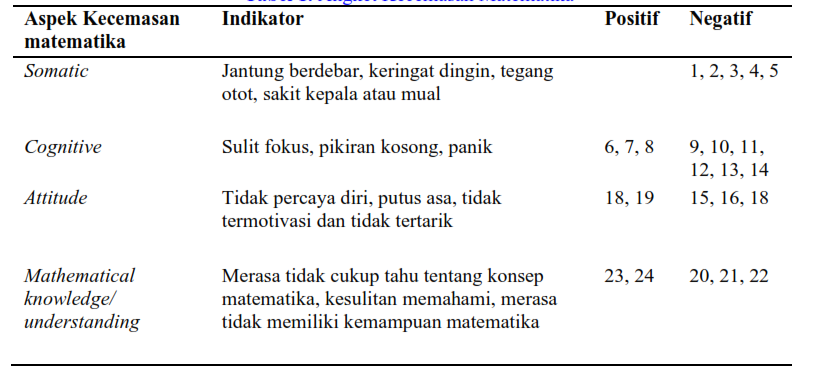Analisis Kecemasan Matematika: Studi Kasus Mata Kuliah Statistika di Lintas Disiplin Ilmu
https://doi.org/10.51574/kognitif.v5i3.2534
Keywords:
Kecemasan Matematika , Statistika , Mahasiswa Lintas Disiplin IlmuAbstract
Kecemasan matematika merupakan faktor yang sering kali menjadi penghambat dalam memahami konsep dasar statistika, peluang, dan aplikasi statistika, yang esensial bagi mahasiswa dalam menganalisis data penelitian. Penelitian ini bertujuan untuk menganalisis tingkat kecemasan matematika pada mahasiswa, khususnya dalam konteks pembelajaran mata kuliah statistika di program studi Psikologi. Metode penelitian menggunakan pendekatan deskriptif kualitatif, dengan subjek penelitian sebanyak 40 mahasiswa semester I program studi Psikologi di Universitas Tjut Nyak Dhien Medan. Teknik pengumpulan data menggunakan angket kecemasan matematika yang diadaptasi dari Mathematics Anxiety Rating Scale (MARS), wawancara semi-terstruktur dengan 13 mahasiswa yang memiliki tingkat kecemasan tinggi, dan dokumentasi hasil belajar. Analisis data dilakukan melalui tiga tahap: reduksi data, penyajian data, dan penarikan kesimpulan dengan teknik triangulasi untuk memastikan keabsahan data. Hasil penelitian menunjukkan bahwa mayoritas mahasiswa (70%) mengalami kecemasan matematika pada tingkat sedang hingga tinggi, yang dipengaruhi oleh persepsi mereka terhadap kesulitan matematika, pengalaman belajar sebelumnya, dan kurangnya keterkaitan langsung antara konsep statistika dengan bidang Psikologi. Penelitian ini merekomendasikan pendekatan pembelajaran kontekstual yang lebih aplikatif, penggunaan teknologi pendukung, serta pemberian bimbingan tambahan untuk membantu mahasiswa mengatasi kecemasan matematika. Temuan ini diharapkan dapat menjadi acuan bagi dosen dalam merancang strategi pembelajaran yang lebih efektif dan mendukung keterlibatan mahasiswa memahami statistika secara holistik.
Downloads
References
Artemenko, C., Daroczy, G., & Nuerk, H.-C. (2015). Neural correlates of math anxiety – an overview and implications. Frontiers in Psychology, 6. https://doi.org/10.3389/fpsyg.2015.01333
Auliya, R. N. (2016). Kecemasan Matematika dan Pemahaman Matematis. Formatif: Jurnal Ilmiah Pendidikan MIPA, 6(1). https://doi.org/10.30998/formatif.v6i1.748
Bandura, A. (1997). Self-efficacy: The exercise of control. (hlm. ix, 604). W H Freeman/Times Books/ Henry Holt & Co.
Barroso, C., Ganley, C. M., McGraw, A. L., Geer, E. A., Hart, S. A., & Daucourt, M. C. (2021). A meta-analysis of the relation between math anxiety and math achievement. Psychological Bulletin, 147(2), 134–168. https://doi.org/10.1037/bul0000307
Beilock, S. L., & Maloney, E. A. (2015). Math Anxiety: A Factor in Math Achievement Not to Be Ignored. Policy Insights from the Behavioral and Brain Sciences, 2(1), 4–12. https://doi.org/10.1177/2372732215601438
Carey, E., Hill, F., Devine, A., & Szücs, D. (2016). The Chicken or the Egg? The Direction of the Relationship Between Mathematics Anxiety and Mathematics Performance. Frontiers in Psychology, 6. https://doi.org/10.3389/fpsyg.2015.01987
Caviola, S., Toffalini, E., Giofrè, D., Ruiz, J. M., Szűcs, D., & Mammarella, I. C. (2022). Math Performance and Academic Anxiety Forms, from Sociodemographic to Cognitive Aspects: A Meta-analysis on 906,311 Participants. Educational Psychology Review, 34(1), 363–399. https://doi.org/10.1007/s10648-021-09618-5
Cooke, A., Cavanagh, R., Hurst, C., & Sparrow, L. (2011). Situational effects of mathematics anxiety in pre-service teacher education. Proceedings of the AARE Conference. Tas.: Australian Association for Research in Education.
Finlayson, M. (2014). Addressing math anxiety in the classroom. Improving Schools, 17(1), 99–115. https://doi.org/10.1177/1365480214521457
Foley, A. E., Herts, J. B., Borgonovi, F., Guerriero, S., Levine, S. C., & Beilock, S. L. (2017). The Math Anxiety-Performance Link: A Global Phenomenon. Current Directions in Psychological Science, 26(1), 52–58. https://doi.org/10.1177/0963721416672463
Hart, S. A., & Ganley, C. M. (2019). The nature of math anxiety in adults: Prevalence and correlates. Journal of Numerical Cognition, 5(2), 122–139. https://doi.org/10.5964/jnc.v5i2.195
Henschel, S., & Roick, T. (2017). Relationships of mathematics performance, control and value beliefs with cognitive and affective math anxiety. Learning and Individual Differences, 55, 97–107. https://doi.org/10.1016/j.lindif.2017.03.009
Hill, F., Mammarella, I. C., Devine, A., Caviola, S., Passolunghi, M. C., & Szűcs, D. (2016). Maths anxiety in primary and secondary school students: Gender differences, developmental changes and anxiety specificity. Learning and Individual Differences, 48, 45–53. https://doi.org/10.1016/j.lindif.2016.02.006
Hunt, T. E., Bhardwa, J., & Sheffield, D. (2017). Mental arithmetic performance, physiological reactivity and mathematics anxiety amongst U.K. primary school children. Learning and Individual Differences, 57, 129–132. https://doi.org/10.1016/j.lindif.2017.03.016
Kusmaryono, I. (2020). Interaksi Gaya Mengajar dan Konten Matematika sebagai Faktor Penentu Kecemasan Matematika. Jurnal Pendidikan Matematika, 9.
Maloney, E. A., & Beilock, S. L. (2012). Math anxiety: Who has it, why it develops, and how to guard against it. Trends in Cognitive Sciences, 16(8), 404–406. https://doi.org/10.1016/j.tics.2012.06.008
OECD. (2023). PISA 2022 Results (Volume I): The State of Learning and Equity in Education. OECD. https://doi.org/10.1787/53f23881-en
Paechter, M., Macher, D., Martskvishvili, K., Wimmer, S., & Papousek, I. (2017). Mathematics Anxiety and Statistics Anxiety. Shared but Also Unshared Components and Antagonistic Contributions to Performance in Statistics. Frontiers in Psychology, 8, 1196. https://doi.org/10.3389/fpsyg.2017.01196
Passolunghi, M. C., De Vita, C., & Pellizzoni, S. (2020). Math anxiety and math achievement: The effects of emotional and math strategy training. Developmental Science, 23(6), e12964. https://doi.org/10.1111/desc.12964
Pizzie, R. G., & Kraemer, D. J. M. (2021). The Association Between Emotion Regulation, Physiological Arousal, and Performance in Math Anxiety. Frontiers in Psychology, 12, 639448. https://doi.org/10.3389/fpsyg.2021.639448
Purba, P. B. (2023). Kecemasan Matematika pada Mahasiswa Pendidikan Matematika. 7.
Ramirez, G., Shaw ,Stacy T., & and Maloney, E. A. (2018). Math Anxiety: Past Research, Promising Interventions, and a New Interpretation Framework. Educational Psychologist, 53(3), 145–164. https://doi.org/10.1080/00461520.2018.1447384
Richardson, F., & Suinn, R. (1972). The Mathematics Anxiety Rating Scale. Journal of Counseling Psychology, 19, 551–554. https://doi.org/10.1037/h0033456
Schunk, D. H., & Pajares, F. (2009). Self-efficacy theory. Dalam Handbook of motivation at school. (hlm. 35–53). Routledge/Taylor & Francis Group. https://doi.org/10.4324/9780203879498
Sugiyono. (2019). Metode Penelitian Kuantitatif Kualitatif dan R&D. CV: Alfabeta. Bandung.
Wang, Z., Lukowski, S. L., Hart, S. A., Lyons, I. M., Thompson, L. A., Kovas, Y., Mazzocco, M. M. M., Plomin, R., & Petrill, S. A. (2015). Is Math Anxiety Always Bad for Math Learning? The Role of Math Motivation. Psychological Science, 26(12), 1863–1876. https://doi.org/10.1177/0956797615602471

Downloads
Published
How to Cite
Issue
Section
License
Copyright (c) 2025 Fitry Wahyuni, Hamidah Nasution

This work is licensed under a Creative Commons Attribution-ShareAlike 4.0 International License.
Education and Talent Development Center of Indonesia (ETDC Indonesia)
e-mail: kognitif@gmail.com, website : https://etdc-indonesia.com

Kognitif: Jurnal Riset HOTS Pendidikan Matematika dengan Situs: https://etdci.org/journal/kognitif berlisensi Creative Commons Attribution-ShareAlike 4.0 International License









.png)

